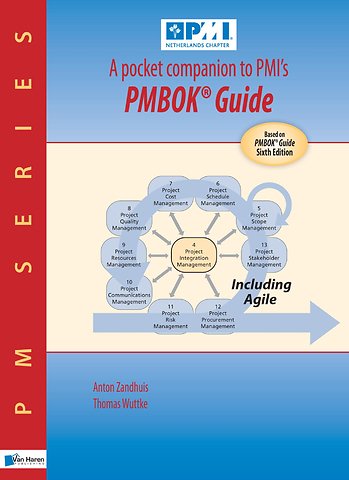A pocket companion to PMI’s PMBOK Guide
E-book Pdf met watermerkbeveiliging Engels 2019 6e druk 9789401801119Samenvatting
This pocket guide is based on the PMBOK® Guide Sixth Edition. It contains a summary of the PMBOK® Guide, to provide a quick introduction as well as a structured overview of this framework for project management.
This pocket guide deals with the key issues and themes within project management and the PMBOK Guide as follows:
- Key terms and definitions in the project management profession
- A short overview of the activities of PMI Inc., the organization and its standards: PMBOK® Guide, Standard for Project Portfolio Management, Standard for Program Management and other standards.
- The essentials of the Project Lifecycle and Organization.
- What are the key project management knowledge areas and processes?
Main target Group for this pocket guide is anyone with an interest in understanding the PMBOK® Guide framework or a systematic approach for project management. The book is also very useful for members of a project management team in a project environment using the PMBOK® Guide as a shared reference. A complete but concise description of the PMBOK® Guide, for anyone involved in projects or project management.
Trefwoorden
pmbok guide projectmanagement projecten agile pmi projectmanagementprocessen kennisgebieden projectmatig werken procesgericht hybride projectmanagement projectfasen projectlevenscyclus procesgroepen stakeholdermanagement projectportfoliomanagement risicomanagement scopemanagement integratiemanagement kostenmanagement tijdplanmanagement kwaliteitsmanagement communicatiemanagement agile projectmanagement inkoopmanagement projectrollen waterval lean projectgovernance projectsucces projectorganisatie
Trefwoorden
Specificaties
Lezersrecensies
Inhoudsopgave
U kunt van deze inhoudsopgave een PDF downloaden
Introduction 13
1.1 Purpose of this Pocket Companion to PMI’s PMBOK® Guide 13
1.2 Practical tips for using this pocket guide 14
1.3 Project management and its value 15
1.4 Successfully fulfilling your role as project sponsor, project team member or project manager 17
1.5 FAQs 19
Management Institute (PMI) 29
2.1 PMI’s facts and figures 29
2.2 Available global standards of PMI 30
2.3 Available certifications 32
2.4 Geographical representation of PMI and translations 34
2.5 Other PMI initiatives 35
The PMBOK® Guide at a glance 39
3.1 History of the PMBOK® Guide 39
3.2 Structure of the PMBOK® Guide 40
3.3 Project – program – portfolio 42
3.4 Project life cycle 44
3.5 Project phases 46
3.6 Project management process groups 46
3.7 Project management knowledge areas 48
3.8 Project management processes 49
3.9 Enterprise environmental factors (EEFs) 49
3.10 Organizational process assets (OPAs) 49
3.11 Stakeholders 50
3.12 Organizational structures 50
3.13 The project manager’s role 56
Project Integration Management 59
4.1 Develop Project Charter 61
4.2 Develop Project Management Plan 63
4.3 Direct and Manage Project Work 64
4.4 Manage Project Knowledge 65
4.5 Monitor and Control Project Work 66
4.6 Perform Integrated Change Control 66
4.7 Close Project or Phase 67
Project Scope Management 69
5.1 Plan Scope Management 70
5.2 Collect Requirements 71
5.3 Define Scope 73
5.4 Create Work Breakdown Structure (WBS) 75
5.5 Validate Scope 77
5.6 Control Scope 78
Project Schedule Management 81
6.1 Plan Schedule Management 82
6.2 Define Activities 82
6.3 Sequence Activities 83
6.4 Estimate Activity Durations 85
6.5 Develop Schedule 87
6.6 Control Schedule 90
Project Cost Management 91
7.1 Plan Cost Management 92
7.2 Estimate Costs 93
7.3 Determine Budget 95
7.4 Control Costs 95
Project Quality Management 101
8.1 Plan Quality Management 102
8.2 Manage Quality 104
8.3 Control Quality 105
Project Resource Management 107
9.1 Plan Resource Management 108
9.2. Estimate Activity Resources 110
9.3 Acquire Resources 111
9.4 Develop Team 112
9.5 Manage Team 114
9.6 Control Resources 116
Project Communications Management 117
10.1 Plan Communications Management 120
10.2 Manage Communications 121
10.3 Monitor Communications 123
Project Risk Management 125
11.1 Plan Risk Management 126
11.2 Identify Risks 128
11.3 Perform Qualitative Risk Analysis 130
11.4 Perform Quantitative Risk Analysis 131
11.5 Plan Risk Responses 132
11.6 Implement Risk Responses 133
11.7 Monitor Risks 133
Project Procurement Management 135
12.1 Plan Procurement Management 137
12.2 Conduct Procurements 138
12.3 Control Procurements 139
Project Stakeholder Management 141
13.1 Identify Stakeholders 142
13.2 Plan Stakeholder Engagement 144
13.3 Manage Stakeholder Engagement 146
13.4 Monitor Stakeholder Engagement 146
Agile and PMI’s PMBOK® Guide Combined 147
14.1 Introduction 147
14.2 What is Agile? 148
14.3 The value of Agile project management 149
14.4 Agile considerations for Integration Management 152
14.5 Agile considerations for Scope Management 154
14.6 Agile considerations for Schedule Management 156
14.7 Agile considerations for Cost Management 157
14.8 Agile considerations for Quality Management 159
14.9 Agile considerations for Resources Management 159
14.10 Agile considerations for Communication Management 161
14.11 Agile considerations for Risk Management 163
14.12 Agile considerations for Procurement Management 164
14.13 Agile considerations for Stakeholder Management 165
Glossary 167
About the Authors 185
Anderen die dit e-book kochten, kochten ook
Rubrieken
- advisering
- algemeen management
- coaching en trainen
- communicatie en media
- economie
- financieel management
- inkoop en logistiek
- internet en social media
- it-management / ict
- juridisch
- leiderschap
- marketing
- mens en maatschappij
- non-profit
- ondernemen
- organisatiekunde
- personal finance
- personeelsmanagement
- persoonlijke effectiviteit
- projectmanagement
- psychologie
- reclame en verkoop
- strategisch management
- verandermanagement
- werk en loopbaan








